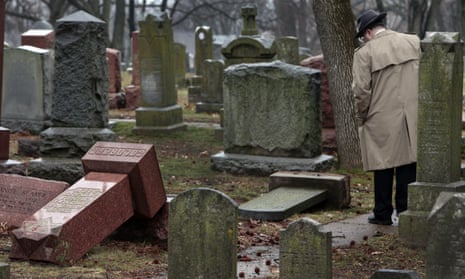“The antisemitic threats targeting our Jewish community and community centers are horrible, and are painful, and a very sad reminder of the work that still must be done to root out hate and prejudice and evil,” Donald Trump told reporters at the National Museum of African American History and Culture in Washington on Tuesday.
By any reasonable standard it was a rote remark – antisemitism is “horrible” – the sort of throwaway line that, uttered by another president, or more likely, some reasonably articulate eigth-grader mid-speech and debate tournament, might seem unremarkable. But coming from Trump it drew praise as a “strong rebuke”.
This is how low we set the bar for Trump.
His maddening insistence on Tuesday that really, he denounces antisemitism “whenever I get a chance”, simply isn’t reflected in his actual record.
Remember when, during an appearance with the Israeli prime minister last week, Trump was asked if his rhetoric contributed to a rise in antisemitism? He responded, inexplicably, with a self-congratulatory riff on his electoral college victory. A day later, when a Jewish reporter asked about that very issue, he sniffed that it was “very insulting”. He then told that reporter to “sit down”. The reporter did – but the rest of us shouldn’t.
Steven Goldstein of the Anne Frank Center for Mutual Respect said he could not stomach Trump’s stoking of racial, religious and ethnic resentments throughout the campaign. Nor can he forgive his administration’s wiping away all mention of the Jewish people on Holocaust Remembrance Day.
On social media, Goldstein called Trump’s comments a “Band-Aid on the cancer of antisemitism that has infected his own administration” and “a pathetic asterisk of condescension after weeks in which he and his staff have committed grotesque acts and omissions reflecting antisemitism.”
In the lead-up to Trump’s presidency, leaders everywhere sought to give Trump the benefit of the doubt. And it’s tempting to do that again here, to praise Trump for at least moving in the right direction. Well, we shouldn’t, and he isn’t.
Trump’s best skill has always been gauging what his audience wants and then telling them whatever that is. And it’s no coincidence that the remarks so many would construe as signs of progress came during his visit to a museum dedicated to the preservation of minority history.
It is also relevant that his comments came following renewed antisemitic attacks, under unrelenting public pressure for a response, and after a disastrous week for Trump’s team politically.
Any hope engendered by the lip service Trump paid Tuesday should be offset by his administration’s poor record of dealing sensitively with concerns over antisemitism.
“When someone shows you who they are,” as Maya Angelou said, and Hillary Clinton reminded us with an almost haunting frequency throughout the campaign, “believe them.”
Sure, Trump said Tuesday, “we have to fight bigotry, intolerance and hatred in all of its very ugly forms.” But to many observers of the presidential election, the form they took was Trump. That’s why boilerplate statements on antisemitism are not enough. We need a president who shows he really cares. This doesn’t cut it.

